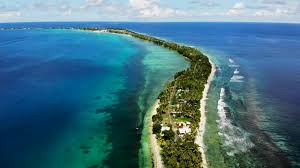
Introduction
Tuvalu, a small island nation in the Pacific Ocean, has recently garnered global attention due to its vulnerability to climate change. Comprising just nine islands with a total land area of approximately 26 square kilometers, Tuvalu is one of the lowest-lying countries on Earth. As rising sea levels threaten its very existence, the situation highlights the urgent need for global action against climate change.
The Challenges Tuvalu Faces
Tuvalu is particularly susceptible to the effects of climate change, with some projections indicating that the islands could be completely submerged within the next few decades if current trends continue. The nation’s highest point is only about four to five meters above sea level, making it especially vulnerable to storm surges and coastal erosion. Moreover, freshwater resources are diminishing as seawater increasingly contaminates aquifers, posing a significant threat to the islanders’ livelihood.
In an effort to combat these challenges, Tuvalu’s government has continuously advocated for more stringent global policies regarding greenhouse gas emissions. Recently, Tuvalu participated in international climate negotiations, where officials urged wealthier nations to uphold their commitments to cut emissions and provide financial assistance to vulnerable nations that are dealing with the effects of climate change.
International Efforts and Responses
Various international organizations have recognized Tuvalu’s plight. The United Nations Framework Convention on Climate Change (UNFCCC) has facilitated discussions aimed at addressing the concerns of countries like Tuvalu. In addition, non-governmental organizations (NGOs) are working to raise awareness and fund projects that bolster the island’s resilience against climate impacts.
Tuvalu has made significant strides in demonstrating global solidarity through innovative measures. They have invested in renewable energy sources, such as solar power, which not only aims to reduce their carbon footprint but also aims to alleviate dependence on imported fossil fuels.
Conclusion
In summary, Tuvalu is a nation on the frontline of the climate crisis, exemplifying the urgency needed to address this global issue. The ability of Tuvalu to sustain its population in the face of rising sea levels and climate change will depend largely on the global community’s commitment to action. As the world watches Tuvalu navigate these challenges, its struggle serves as a reminder of the critical need to combat climate change collectively before it’s too late. Continued support for nations like Tuvalu is essential not only for their survival but also for the health of our planet’s future.



